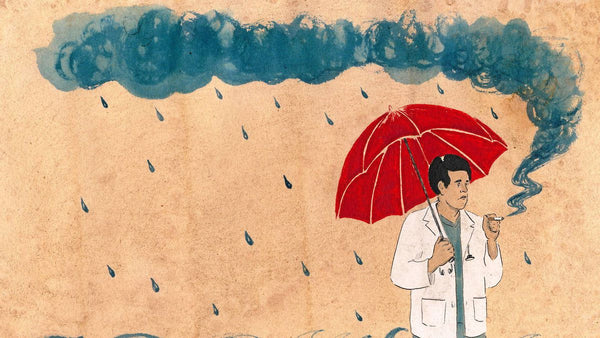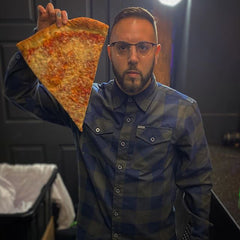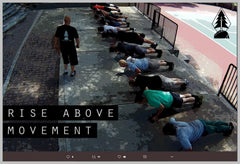
From the article at the Globe and Mail,
By Nikhil Joshi,
Art by Emily Flake
I remember the day and reason I took up smoking. It was September, 2005. My close friend Fraser had died in a motor vehicle accident. I had just given his eulogy an hour before.
I had smoked casually in the past, but I bought my first pack thinking I’d most likely not buy any more. I thought I just needed to smoke for a while to cope. And while my regular consumption of cigarettes stayed between three and seven a day, during stressful times it would become more.
And so things persisted, even when I was admitted to medical school four years ago. The constant badgering of my classmates to quit did nothing but harden my resolve. I made smoking part of my identity. I was a man in medicine who wouldn’t become some cookie-cutter do-gooder. No – I wasn’t going to let medicine or other people change me.
But the pressure didn’t just come from my classmates. In almost every subject, time was devoted to explaining the hazards of smoking. On occasion a lecturer would ask if there were any smokers in our class, and some of my classmates would turn and stare at me accusingly. I would stare right back at them as if they were the smokers.
I hid my habit from lecturers and physicians, tacitly acknowledging that I was becoming part of a system that did not like my kind.
Still I continued to smoke, most embarrassingly having two cigarettes before my final cardiology exam. The irony of it all wasn’t lost on me as I hid behind the library trying to remember risk factors for heart attacks while indulging in one of them.
In my third year of medicine I became a clinical clerk, which is the time when medical students around Canada enter the hospital system to learn firsthand. It’s one of the more stressful years in medicine, but is also intensely rewarding.
Working on my family medicine rotation in rural Newfoundland, I saw many patients who had been pack-a-day smokers for decades. My preceptor was a much-loved family physician who always stressed that I should ask patients their smoking history: How much did they smoke, for how many years, were they willing to quit? I hated doing that.
As soon as you ask a smoker about their smoking they get defensive, often minimizing the amount they smoke and how long they have been doing so. They’re afraid they’re about to be nagged and patronized yet again.
At first, I fell into the routine and gave the same speeches I had been trained to give. I became a robot, talking about the risks of smoking, the cellular changes happening, and how this could all become better if people would just quit.
Then, one evening, I went home and looked at myself in the mirror. I had thought I had integrity in refusing to become someone different, but I was worse than a robot: I was a liar. How could I counsel people about quitting smoking when I was still on three cigarettes a day?
I stopped using the rehearsed lines. In exasperation I told a patient, “Look, I smoke too, okay? I know quitting is not the easiest thing in the world.” Then I asked him when his favourite smoke was.
“You know, Doc, I really need one in the morning and I know that’s bad.” His whole demeanour had changed from being a defensive old man to a human being who was struggling to make positive change.
I told him the morning smoke was the hardest one to give up. But he could delay and delay it until it was no longer first thing in the morning. I started to talk to all the smokers about quitting, about how you become so irritated that the slightest provocation sends you into a full-blown rage. Or how everybody says “you should quit” like it’s some original thought you’ve never heard in your life.
I watched in-patient smokers become pariahs at hospitals, walking with their IV poles into the parking lot because smoking wasn’t allowed near the entrance, what little dignity they had blowing away in the wind. Any amount of cigarette smoking is harmful, and smokers need to take responsibility for aspects of their own health, but they should still be treated like human beings and adults.
As for me, I stopped smoking in steps over several months. The first major event that helped me quit was working on the oncology wards. I looked after a young man with two young children who died in his 40s of lung cancer. I still remember his wife begging me, days before his death, to find a way to get him off the many machines we were using so he could go home and spend a few days there before he died. He was home for less than 48 hours before he passed.
The next motivation came from a girl I had fallen in love with. While she had tried words to make me quit – with the same success as everyone else in my life – it was only when she, a non-smoker, took my pack of cigarettes and smoked one right next to me that I relented a fair bit. Watching her smoke that cigarette was heartbreaking.
The last push came on a sombre August day in 2011, what would have been Fraser’s 25th birthday. By then, smoking had been stripped of all its makeup, and I knew that this coping mechanism I had developed after the loss of a good friend was something he wouldn’t have supported. He always hated it when I smoked.
Nikhil Joshi lives in St. John’s.







Leave a comment